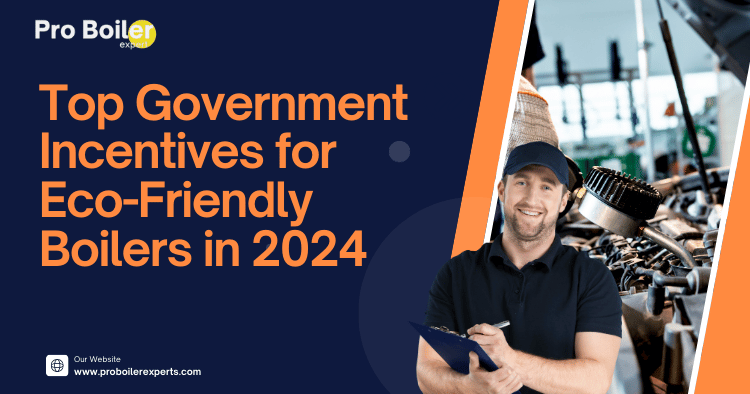Table of Contents
- Introduction
- What Are Eco-Friendly Boilers?
- Why Are Government Incentives Important?
- Key Incentives for Eco-Friendly Boilers in 2024
- How to Apply for These Incentives
- FAQs
- Conclusion
Introduction
As the global community emphasizes sustainability, governments around the world are stepping up to encourage eco-friendly practices. One significant area of focus is heating systems, particularly eco-friendly boilers. This blog will explore the various government incentives available in 2024 that can help homeowners and businesses transition to these greener technologies.
What Are Eco-Friendly Boilers?
Eco-friendly boilers are heating systems designed to operate more efficiently and produce fewer emissions than traditional models. They often use renewable energy sources, such as biomass or solar energy, or highly efficient gas systems that minimize waste. These boilers not only reduce your carbon footprint but can also lead to significant savings on energy bills.

Why Are Government Incentives Important?
Government incentives play a crucial role in making eco-friendly technologies more accessible. By providing financial assistance, governments can:
- Lower the initial investment barrier: Eco-friendly boilers can be more expensive upfront than traditional ones. Incentives help bridge this gap.
- Encourage adoption of sustainable practices: Financial incentives motivate more homeowners and businesses to invest in green technologies.
- Contribute to climate goals: Widespread adoption of eco-friendly technologies can significantly reduce greenhouse gas emissions.
“Investing in eco-friendly technology is not just an option anymore; it’s a necessity for a sustainable future.”
Key Incentives for Eco-Friendly Boilers in 2024
Tax Credits and Deductions
In 2024, many countries, including the United States, are offering substantial tax credits for upgrading to eco-friendly boilers. Under the Inflation Reduction Act, homeowners can receive a tax credit of up to 30% of the cost of new energy-efficient equipment, including boilers.
Example Table: Tax Credits for Eco-Friendly Boilers
| Type of Boiler | Tax Credit Percentage | Maximum Credit Amount |
|---|---|---|
| Biomass Boilers | 30% | $2,000 |
| Solar Thermal Boilers | 30% | $4,000 |
| High-Efficiency Gas | 30% | $1,500 |
Source: Energy.gov
“Tax credits can dramatically reduce the financial burden of investing in eco-friendly technologies, making it a win-win for both the environment and your wallet.”
Rebates and Grants
Many states are offering rebates and grants to incentivize the purchase of eco-friendly boilers. For instance, California’s Energy Commission has programs that provide up to $1,500 in rebates for residential upgrades. These rebates can significantly reduce the overall cost of installation.
Additionally, homeowners can explore options for biomass boilers or solar thermal boilers, which are highlighted for their eco-friendly benefits in this article.
“Rebates and grants can be game-changers, making eco-friendly upgrades accessible to more households.”
Low-Interest Loans
To further ease the financial burden, some governments are offering low-interest loans for the installation of eco-friendly boilers. These loans often have terms as low as 1% and can be paid back over several years. This option is particularly beneficial for businesses looking to upgrade their heating systems without impacting their cash flow significantly.
State and Local Programs
In addition to federal incentives, many states and municipalities have their own programs designed to promote the use of eco-friendly technology. For example, New York State has a Clean Heat Program that provides financial assistance for installing energy-efficient heating systems.
How to Find Local Programs:
- Visit your state’s energy department website.
- Contact local utility companies for available incentives.
“State and local programs can offer tailored solutions that meet the unique needs of your community.”
How to Apply for These Incentives
Applying for government incentives can be straightforward if you follow these steps:
- Research: Identify the incentives available in your area. Websites like DSIRE provide comprehensive databases of incentives.
- Choose the Right Boiler: Ensure the boiler you select meets the eligibility criteria for the incentive programs. Options like smart boilers or condensing boilers can be particularly beneficial, as discussed in various articles on Pro Boiler Experts.
- Gather Documentation: Prepare necessary documents, including receipts, installation contracts, and any required forms.
- Submit Your Application: Follow the instructions for each program carefully to ensure your application is complete.
- Follow Up: After submission, keep track of your application status and respond promptly to any requests for additional information.
“Being organized and thorough in your application process can significantly improve your chances of receiving incentives.”
FAQs
Q: What types of boilers qualify for government incentives?
A: Generally, high-efficiency gas boilers, biomass boilers, and solar thermal systems are eligible. Always check specific program guidelines.
Q: How much can I save by upgrading to an eco-friendly boiler?
A: Savings vary based on your current system and usage, but many households report reductions in energy bills of up to 30%.
Q: Are there specific deadlines for applying for these incentives?
A: Yes, many programs have specific deadlines, so it’s essential to check the details on the respective program websites.
Q: Can businesses apply for these incentives?
A: Absolutely! Many incentives are available for both residential and commercial properties.
“Whether you’re a homeowner or a business owner, there are financial incentives available to support your transition to greener technologies.”
Conclusion
Transitioning to an eco-friendly boiler is not only a step toward sustainability but also an opportunity to save money in the long run. With the various government incentives available in 2024, there has never been a better time to make the switch. By taking advantage of tax credits, rebates, low-interest loans, and state programs, you can significantly reduce the financial burden of upgrading your heating system. Explore your options today, and contribute to a greener tomorrow!
For more detailed information, check out resources such as Energy Star and the Environmental Protection Agency. Also, consider reading about the benefits of upgrading to an efficient boiler here.





